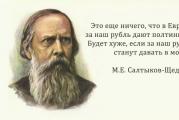Who was the last ruler of the USSR. The best ruler of the ussr
Historians call the dates of Stalin's reign the period from 1929 to 1953. Joseph Stalin (Dzhugashvili) was born on December 21, 1879. Many contemporaries of the Soviet era associate the years of Stalin's rule not only with the victory over fascist Germany and an increase in the level of industrialization of the USSR, but also with numerous repressions of the civilian population.
During the reign of Stalin, about 3 million people were imprisoned and sentenced to death. And if we add to them those sent into exile, dispossessed and deported, then the victims among the civilian population in the Stalin era can be counted as about 20 million people. Now many historians and psychologists are inclined to believe that the situation within the family and upbringing in childhood had a huge impact on Stalin's character.
The formation of Stalin's tough character
From reliable sources it is known that Stalin's childhood was not the happiest and most cloudless. The leader's parents often cursed in front of their son. The father drank a lot and allowed himself to beat his mother in front of little Joseph. The mother, in turn, took out her anger on her son, beat and humiliated him. The unfavorable atmosphere in the family greatly affected Stalin's psyche. Even as a child, Stalin understood a simple truth: whoever is stronger is right. This principle became the motto of the future leader in life. He was also guided by him in governing the country.
In 1902, Joseph Vissarionovich organized a demonstration in Batumi, this step was his first in political career. A little later, Stalin became the Bolshevik leader, and Vladimir Ilyich Lenin (Ulyanov) is among his best friends. Stalin fully shares the revolutionary ideas of Lenin.
In 1913, Joseph Vissarionovich Dzhugashvili first used his pseudonym - Stalin. From that time on, he became known by this surname. Few people know that before the surname Stalin, Joseph Vissarionovich tried on about 30 pseudonyms that never took root.
Stalin's reign
The period of Stalin's rule begins in 1929. Almost all the time of the reign of Joseph Stalin is accompanied by collectivization, mass death of the civilian population and famine. In 1932, Stalin adopted the law "on three spikelets". According to this law, a starving peasant who stole ears of wheat from the state was immediately subject to the highest penalty - execution. All the saved bread in the state was sent abroad. This was the first stage in the industrialization of the Soviet state: the purchase modern technology foreign production.

During the reign of Joseph Vissarionovich Stalin, mass repressions of the peaceful population of the USSR were carried out. The beginning of the repressions was laid in 1936, when the post of People's Commissar of Internal Affairs of the USSR was taken by Yezhov N.I. In 1938, on the orders of Stalin, his close friend, Bukharin, was shot. During this period, many residents of the USSR were exiled to the Gulag or shot. Despite all the cruelty of the measures taken, Stalin's policy was aimed at raising the state and its development.
Pros and cons of Stalin's rule
Minuses:
- tough government policy:
- the almost complete destruction of the highest army officials, intellectuals and scientists (who thought differently from the government of the USSR);
- repression of wealthy peasants and the believing population;
- widening "chasm" between the elite and the working class;
- oppression of the civilian population: wages in products instead of cash rewards, working hours up to 14 hours;
- propaganda of anti-Semitism;
- about 7 million starvation deaths during the period of collectivization;
- prosperity of slavery;
- selective development of branches of the economy of the Soviet state.
Pros:
- creation of a protective nuclear shield in the post-war period;
- an increase in the number of schools;
- creation of children's clubs, sections and circles;
- space exploration;
- lower prices for consumer goods;
- low prices for utilities;
- development of the industry of the Soviet state on the world stage.
In the Stalin era, the social system of the USSR was formed, social, political and economic institutions appeared. Iosif Vissarionovich completely abandoned the NEP policy, carried out the modernization of the Soviet state at the expense of the village. Thanks to the strategic qualities of the Soviet leader, the USSR won the Second World War. The Soviet state began to be called a superpower. The USSR became a member of the UN Security Council. The era of Stalin's rule ended in 1953. N. Khrushchev replaced him as chairman of the government of the USSR.
Mikhail Sergeyevich Gorbachev He was elected President of the USSR on March 15, 1990 at the Third Extraordinary Congress of People's Deputies of the USSR.
On December 25, 1991, in connection with the termination of the existence of the USSR as a state entity, M.S. Gorbachev announced his resignation from the post of President and signed a Decree on the transfer of control of strategic nuclear weapons Russian President Yeltsin.
On December 25, after Gorbachev's resignation, the red state flag of the USSR was lowered in the Kremlin and the flag of the RSFSR was raised. The first and last President of the USSR left the Kremlin forever.
The first president of Russia, then still the RSFSR, Boris Nikolaevich Yeltsin was elected on June 12, 1991 by popular vote. B.N. Yeltsin won in the first round (57.3% of the vote).
In connection with the expiration of the term of office of the President of Russia, Boris N. Yeltsin, and in accordance with the transitional provisions of the Constitution of the Russian Federation, the election of the President of Russia was scheduled for June 16, 1996. It was the only presidential election in Russia where it took two rounds to determine the winner. The elections were held on June 16 - July 3 and were distinguished by the sharpness of the competitive struggle between the candidates. The main competitors were considered the current President of Russia B. N. Yeltsin and the leader of the Communist Party Russian Federation G. A. Zyuganov. According to the election results, B.N. Yeltsin received 40.2 million votes (53.82 percent), well ahead of G. A. Zyuganov, who received 30.1 million votes (40.31 percent). 3.6 million Russians (4.82%) voted against both candidates .
December 31, 1999 at 12:00 Boris Nikolayevich Yeltsin voluntarily ceased to exercise the powers of the President of the Russian Federation and transferred the powers of the President to Prime Minister Vladimir Vladimirovich Putin. On April 5, 2000, the first President of Russia, Boris Yeltsin, was presented with certificates of a pensioner and labor veteran.
December 31, 1999 Vladimir Vladimirovich Putin became acting president.
In accordance with the Constitution, the Federation Council of the Russian Federation has set the date for holding extraordinary presidential elections March 26, 2000.
On March 26, 2000, 68.74 percent of the voters included in the voting lists, or 75,181,071 people, took part in the elections. Vladimir Putin received 39,740,434 votes, which amounted to 52.94 percent, that is, more than half of the votes. On April 5, 2000, the Central Election Commission of the Russian Federation decided to recognize the elections of the President of the Russian Federation as valid and valid, to consider Vladimir Vladimirovich Putin elected to the post of President of Russia.
In the Soviet Union, the private life of the country's leaders was strictly classified and protected as a state secret. the highest degree protection. Only analysis of published recent times materials allows you to lift the veil on the secret of their payroll.
Having seized power in the country, Vladimir Lenin in December 1917 set himself a monthly salary of 500 rubles, which roughly corresponded to the wages of an unskilled worker in Moscow or St. Petersburg. Any other income, including fees, was strictly forbidden to high-ranking party members at the suggestion of Lenin.
The modest salary of the “leader of the world revolution” was quickly eaten up by inflation, but Lenin somehow did not think about where the money comes from for a completely comfortable life, treatment with the involvement of world luminaries and domestic servants, although he did not forget to strictly say to his subordinates every time: “Subtract these expenses from my salary!”
At the beginning of the NEP, the General Secretary of the Bolshevik Party, Joseph Stalin, was given a salary less than half of Lenin's salary (225 rubles), and only in 1935 was it raised to 500 rubles, but already in next year followed by a new increase to 1200 rubles. The average salary in the USSR at that time was 1,100 rubles, and although Stalin did not live on his own salary, he could very well live modestly on it. During the war years, the leader’s salary turned almost to zero as a result of inflation, but at the end of 1947, after the monetary reform, the “leader of all peoples” set himself a new salary of 10,000 rubles, which was 10 times higher than the then average wage in the USSR. At the same time, a system of "Stalin envelopes" was introduced - monthly tax-free payments to the top of the party and Soviet apparatus. Be that as it may, Stalin did not seriously consider his salary and of great importance didn't give it to her.
First among leaders Soviet Union The one who became seriously interested in his salary was Nikita Khrushchev, who received 800 rubles a month, which was 9 times the average salary in the country.
Sybarite Leonid Brezhnev was the first who violated the Leninist ban on additional, except for wages, income for the top of the party. In 1973, he awarded himself the International Lenin Prize (25,000 rubles), and starting in 1979, when Brezhnev's name adorned a galaxy of classics of Soviet literature, huge fees began to pour into the Brezhnev family budget. Brezhnev's personal account in the publishing house of the Central Committee of the CPSU "Politizdat" is replete with thousands of sums for huge circulations and multiple reprints of his masterpieces "Renaissance", "Small Land" and "Virgin Land". It is curious that the general secretary had a habit of often forgetting about his literary income when paying party dues to his favorite party.
Leonid Brezhnev was generally very generous at the expense of "nationwide" state property - both to himself, and to his children, and to those close to him. He appointed his son First Deputy Minister of Foreign Trade. In this post, he became famous for his constant trips for magnificent parties abroad, as well as huge senseless spending there. Brezhnev's daughter led a wild life in Moscow, spending money coming from nowhere on jewelry. Brezhnev's associates, in turn, were generously endowed with dachas, apartments and huge bonuses.
Yuri Andropov, being a member of the Brezhnev Politburo, received 1,200 rubles a month, but when he became General Secretary, he returned the salary of the General Secretary of the Khrushchev era - 800 rubles a month. At the same time, the purchasing power of the “Andropov ruble” was about half that of the “Khrushchev” ruble. Nevertheless, Andropov completely retained the system of "Brezhnev's fees" of the Secretary General and successfully used it. For example, with a basic salary of 800 rubles, his income in January 1984 amounted to 8,800 rubles.
Andropov's successor, Konstantin Chernenko, keeping the general secretary's salary at the level of 800 rubles, intensified his activity in extorting fees, publishing various ideological materials on his own behalf. According to his party card, his income ranged from 1200 to 1700 rubles. At the same time, Chernenko, a fighter for the moral purity of the communists, had a habit of constantly hiding large sums from his native party. So, the researchers could not find in the party card of General Secretary Chernenko in the column for 1984 4550 rubles of the fee received from the payroll of Politizdat.
Mikhail Gorbachev "reconciled" with a salary of 800 rubles until 1990, which was only four times the average salary in the country. Only by combining the posts of president and general secretary in 1990, Gorbachev began to receive 3,000 rubles, while the average salary in the USSR was 500 rubles.
The successor to the general secretaries, Boris Yeltsin, was almost to the end with the “Soviet salary”, not daring to radically reform the salaries of the state apparatus. Only by decree of 1997, the salary of the President of Russia was set at 10,000 rubles, and in August 1999 its size increased to 15,000 rubles, which was 9 times higher than the average wage in the country, that is, it was approximately at the level of the salaries of his predecessors in governing the country, who had the title of general secretary. True, the Yeltsin family had a lot of income from the “outside”.
Vladimir Putin for the first 10 months of his reign received "Yeltsin's rate". However, effective June 30, 2002, the President's annual salary was set at 630,000 rubles (approximately $25,000) plus secrecy and language bonuses. He also receives military pension for the rank of colonel.
From that moment on, the main salary rate of the leader of Russia for the first time since Lenin's time has ceased to be just a fiction, although against the background of wage rates for leaders of the leading countries of the world, Putin's rate looks rather modest. For example, the President of the United States receives 400 thousand dollars, almost the same amount has the Prime Minister of Japan. The salaries of other leaders are more modest: the British Prime Minister has $348,500, the German Chancellor has about $220,000, and the French President has $83,000.
It is interesting to see how the "regional general secretaries" - the current presidents of the CIS countries - look against this background. The former member of the Politburo of the Central Committee of the CPSU, and now the President of Kazakhstan, Nursultan Nazarbayev, essentially lives according to the “Stalinist norms” for the ruler of the country, that is, he and his family are completely and completely provided by the state, but he also set a relatively small salary for himself - 4 thousand dollars a day. month. Other regional general secretaries - the former first secretaries of the Central Committee of the Communist Parties of their republics - formally set themselves more modest salaries. Thus, Azerbaijani President Heydar Aliyev receives only $1,900 a month, while Turkmen President Sapurmurat Niyazov receives only $900. At the same time, Aliyev, having put his son Ilham Aliyev at the head of the state oil company, actually privatized all the country's income from oil - the main currency resource of Azerbaijan, and Niyazov generally turned Turkmenistan into a kind of medieval khanate, where everything belongs to the ruler. Turkmenbashi, and only he, can solve any issue. All foreign exchange funds are managed only personally by Turkmenbashi (Father of the Turkmens) Niyazov, and the sale of Turkmen gas and oil is managed by his son Murad Niyazov.
The situation is worse than others for the former First Secretary of the Central Committee of the Communist Party of Georgia and a member of the Politburo of the Central Committee of the CPSU, Eduard Shevardnadze. With a modest monthly salary of $ 750, he could not establish full control over the country's wealth because of the strong opposition to him in the country. In addition, the opposition keeps a close eye on all personal expenses of President Shevardnadze and his family.
Lifestyle and real opportunities of current leaders former country Sovetov well characterizes the behavior of the wife of Russian President Lyudmila Putina during her husband's recent state visit to the UK. The British prime minister's wife, Sheri Blair, took Ludmila to a 2004 fashion show at Burberry, a well-known design firm among the wealthy. For more than two hours, Lyudmila Putina was shown the latest fashion, and in conclusion, Putin was asked if she would like to buy something. Blueberry prices are very high. For example, even a gas scarf of this company pulls on 200 pounds sterling.
The Russian president's eyes widened so much that she announced the purchase of ... the entire collection. Even super-millionaires did not dare to do this. By the way, because if you buy the entire collection, then people will not understand that you are wearing next year's fashion clothes! After all, no one else has anything comparable. Putin's behavior in this case was not so much the behavior of the wife of a major statesman early XXI century, how much the behavior of the main wife resembled Arab sheikh middle of the XX century, distraught from the amount of petrodollars that fell on her husband.
This episode with Mrs. Putina needs some explanation. Naturally, neither she nor the “art historians in civilian clothes” accompanying her during the display of the collection had as much money with them as the collection cost. This was not required, because in such cases, respected people need only their signature on the check and nothing else. No money or credit cards. Even if the very Mr. President of Russia, who is trying to present himself to the world as a civilized European, was outraged by this act, then, of course, he had to pay.
Other rulers of countries - the former Soviet republics - also know how to "live well." So, a couple of years ago, the six-day wedding of the son of the President of Kyrgyzstan, Akaev, and the daughter of the President of Kazakhstan, Nazarbayev, thundered all over Asia. The scale of the wedding was truly khan's. By the way, both newlyweds only a year ago graduated from the University in College Park (Maryland).
Against this background, the son of Azerbaijani President Heydar Aliyev, Ilham Aliyev, who set a kind of world record, looks quite worthy against this background: in just one evening he managed to lose as much as 4 (four!) Million dollars in the casino. By the way, this worthy representative of one of the “general secretary” clans is now registered as a candidate for the presidency of Azerbaijan. Residents of this one of the poorest countries in terms of living standards are invited to elect either an amateur in the new elections. beautiful life” Aliev’s son or dad Aliev himself, who has already “served” two presidential terms, has crossed the 80-year mark and is so sick that he is no longer able to move independently.
Lenin Vladimir Ilyich (1870-1924) 1917-1923 reign
Stalin ( real name- Dzhugashvili) Joseph Vissarionovich)




